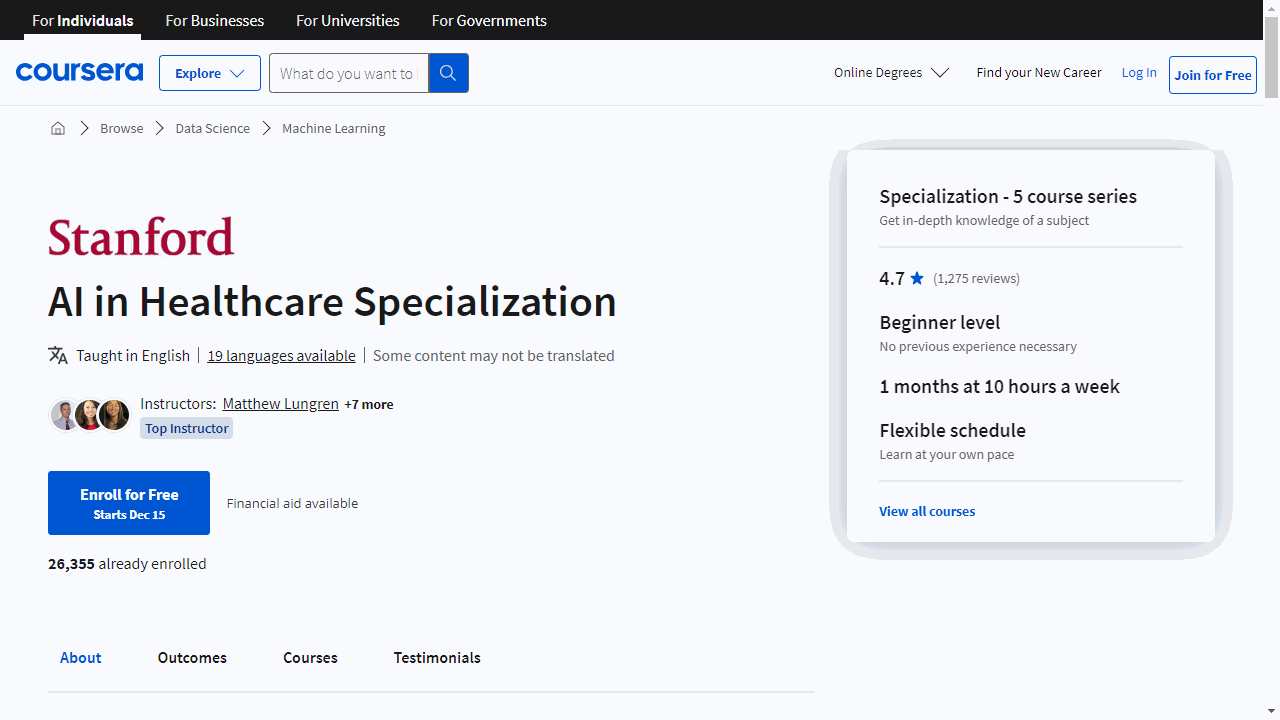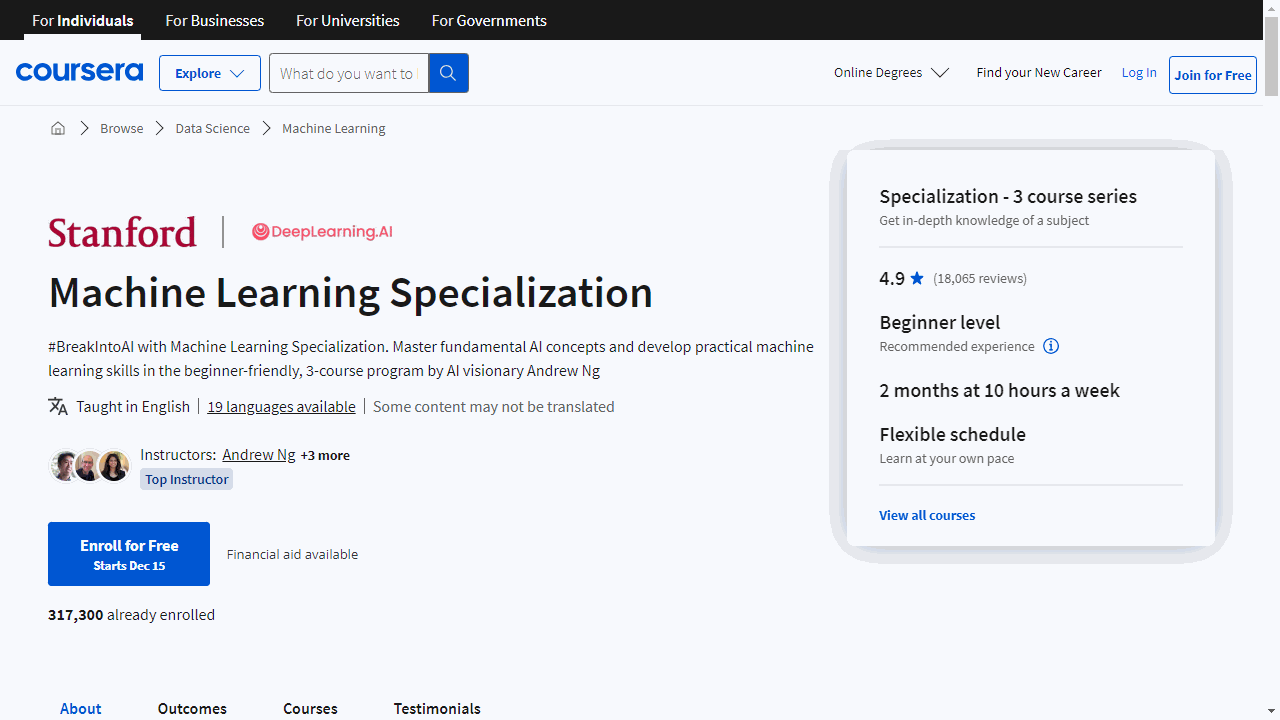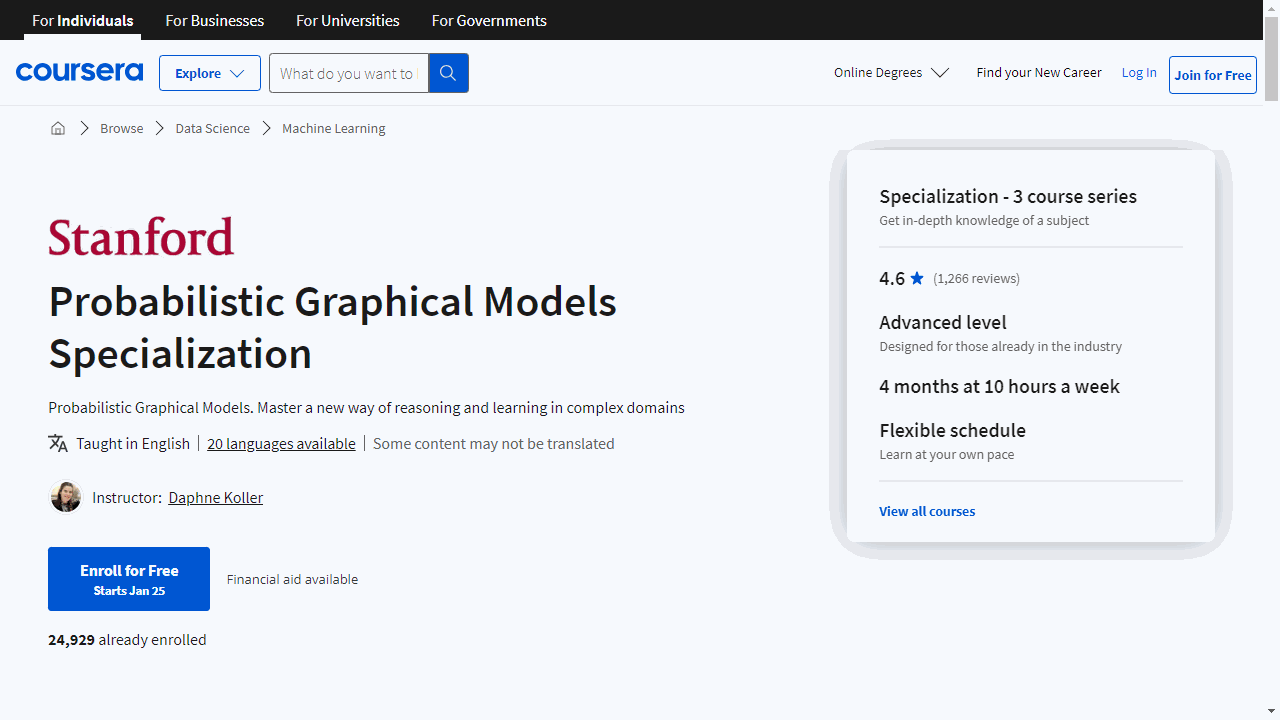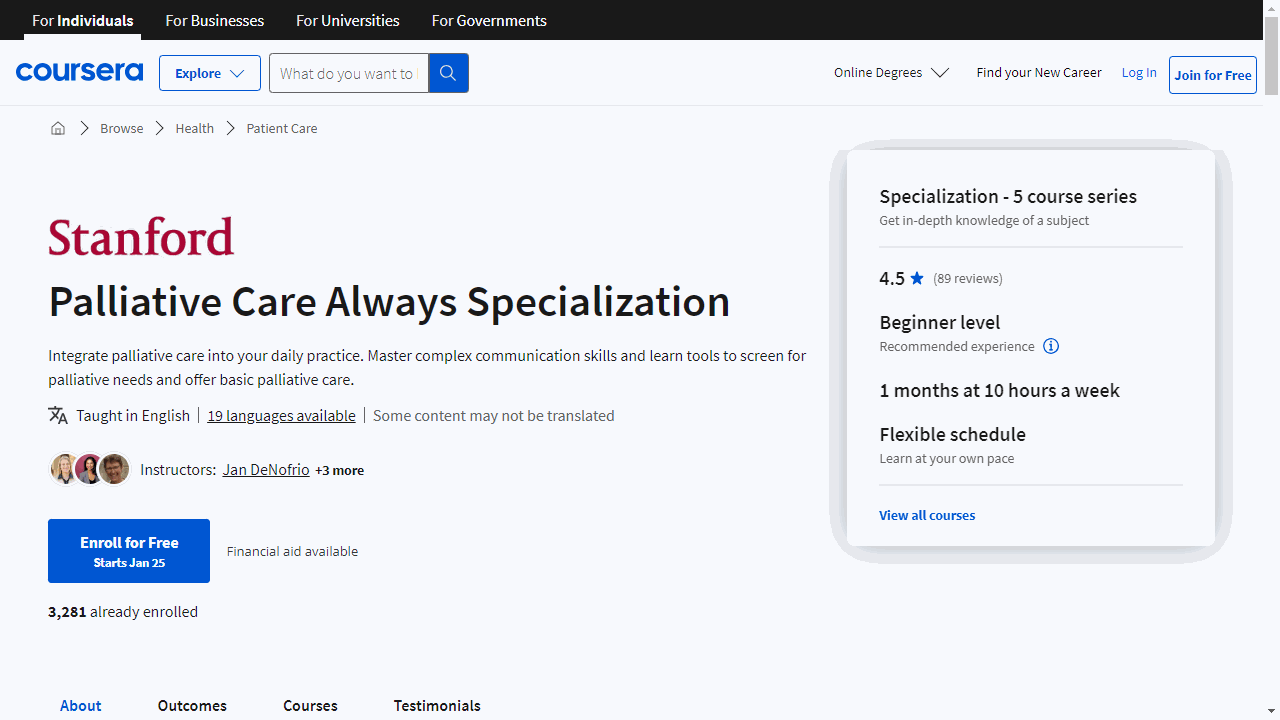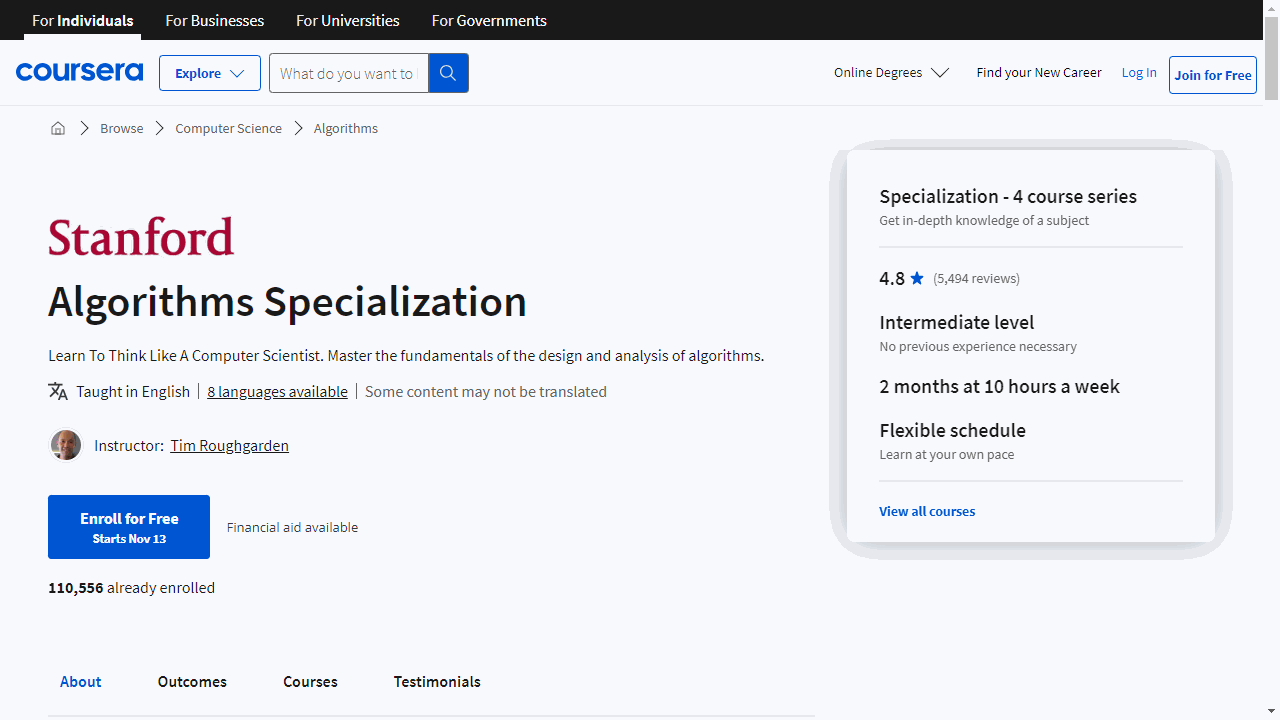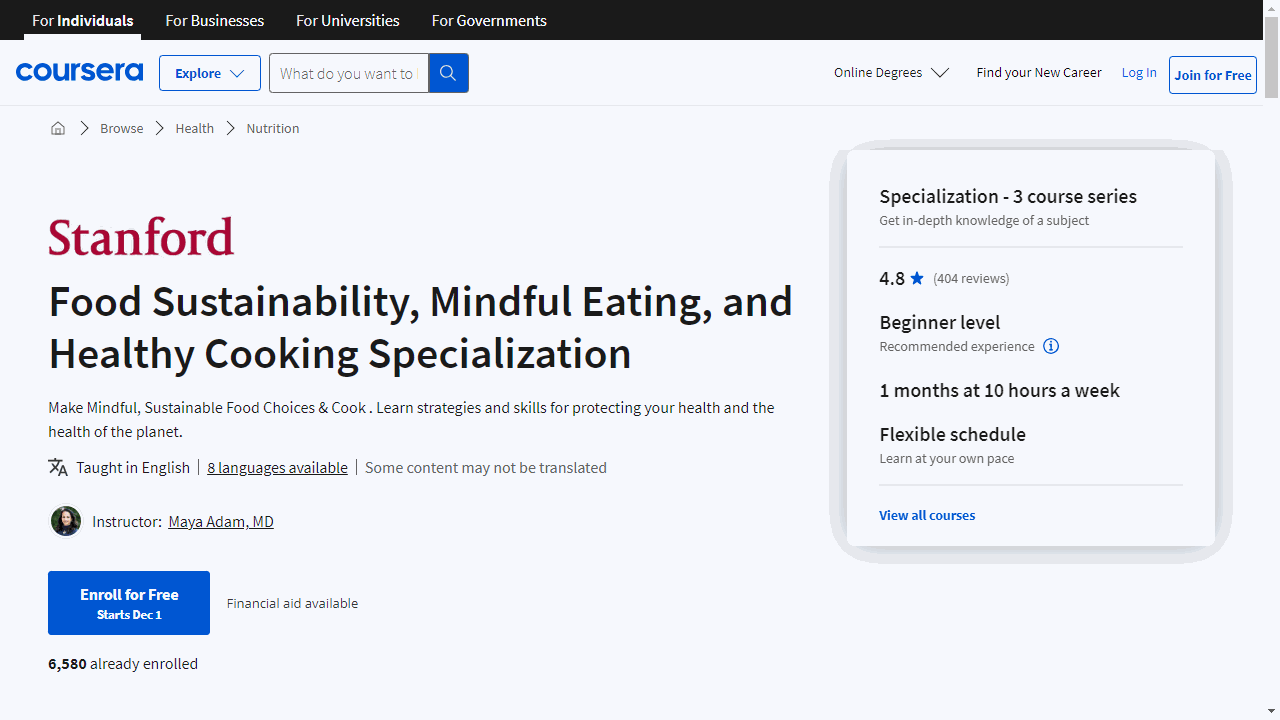Stanford University is renowned for its academic excellence, and its online courses on Coursera offer a chance to learn from world-class professors.
If you’re looking for a top-notch education in a specific field, you might find yourself overwhelmed by the sheer volume of choices.
How do you know which Stanford courses on Coursera are truly the best?
We’ve done the research for you and compiled a list of the best Stanford University courses on Coursera, categorized by subject.
Each course has been carefully selected for its quality, comprehensiveness, and instructor expertise.
For the best overall Stanford University course on Coursera, we recommend Stanford Machine Learning Specialization by Andrew Ng, a renowned AI expert.
This specialization is a comprehensive and updated version of his famous Machine Learning course.
It covers everything from supervised learning to neural networks and beyond, making it a perfect starting point for anyone interested in machine learning.
This is just the beginning!
We’ve included other excellent Stanford University courses on Coursera for various subjects, covering topics like algorithms, healthcare, sustainability, and more.
Keep reading to discover the best course for your needs and interests.
Best Machine Learning Courses By Stanford University On Coursera
Stanford Machine Learning Specialization
Provider: Stanford University, DeepLearning.AI
Taught by AI expert Andrew Ng, this specialization is an updated version of his renowned Machine Learning course.
You’ll benefit from his clear teaching style and deep industry insights.
Starting with “Supervised Machine Learning: Regression and Classification,” you’ll learn to create predictive models using Python, NumPy, and scikit-learn.
You’ll master linear regression for forecasting and logistic regression for tasks like email filtering or disease diagnosis.
In the “Advanced Learning Algorithms” course, you’ll dive deeper.
You’ll build neural networks with TensorFlow, a skill crucial for developing sophisticated AI applications.
You’ll also get to grips with decision trees, random forests, and boosted trees, enhancing your models’ accuracy and reliability.
The final course, “Unsupervised Learning, Recommenders, Reinforcement Learning,” introduces you to AI’s creative side.
You’ll explore clustering, anomaly detection, and build recommender systems using collaborative filtering and content-based methods.
Plus, you’ll tackle deep reinforcement learning, teaching AI to improve through experience.
By completing this specialization, you’ll gain a comprehensive understanding of machine learning, from linear regression to neural networks and beyond.
Probabilistic Graphical Models Specialization
Provider: Stanford University
If you’re ready to dive into the intersection of probability theory, graph algorithms, and machine learning, this specialization will equip you with the skills to excel.
Start with “Probabilistic Graphical Models 1: Representation,” where you’ll master the art of structuring complex problems using Bayesian Networks and Markov networks.
This course is your foundation, setting you up to tackle real-world challenges in fields like medical diagnosis and speech recognition.
If you’re eager for hands-on experience, the honors track offers practical assignments that apply these concepts directly to real-life scenarios.
Move on to “Probabilistic Graphical Models 2: Inference,” where you’ll learn to extract answers from the models you’ve built.
This course is all about the power of prediction, teaching you both exact and approximate algorithms for inference tasks.
If you’re ready to put theory into practice, the honors track has programming assignments that let you implement these algorithms on actual data.
Finally, “Probabilistic Graphical Models 3: Learning” teaches you how to evolve your models through learning from data.
You’ll explore parameter estimation and structure learning, essential for enhancing your models’ predictive abilities.
The honors track continues to offer practical programming assignments, cementing your understanding by applying algorithms to real-world problems.
Throughout these courses, you’ll gain expertise in key areas like Gibbs Sampling, Markov Chain Monte Carlo (MCMC), and the Expectation–Maximization (EM) Algorithm.
Best Healthcare Courses By Stanford University On Coursera
AI in Healthcare Specialization
Provider: Stanford University
By focusing on practical skills and ethical considerations, this specialization prepares you to be a part of AI’s transformative impact on healthcare.
Start with “Introduction to Healthcare,” where you’ll get a clear picture of the U.S. healthcare system’s inner workings.
Understanding the roles of physicians, hospitals, and insurance is crucial, and you’ll tackle the big issues like managing costs and improving care quality.
Move on to “Introduction to Clinical Data,” which equips you with the tools to ethically mine medical data.
You’ll learn to craft datasets and analyze them to answer clinical questions, all while considering the ethical implications of your work.
In “Fundamentals of Machine Learning for Healthcare,” you’ll demystify machine learning, even if you’re new to the field.
This course breaks down complex concepts like neural networks and model training into digestible parts, empowering you to evaluate and deploy AI in medicine confidently.
Then, “Evaluations of AI Applications in Healthcare” guides you through integrating AI into clinical settings.
You’ll explore how to assess AI’s impact on healthcare delivery, ensuring that the technology is used fairly and effectively.
The “AI in Healthcare Capstone” is where theory meets practice.
You’ll dive into a real-world scenario, using a unique dataset to build models that inform patient care decisions.
This hands-on project also addresses the regulatory and ethical considerations of using AI in healthcare.
Throughout these courses, you’ll gain continuing education credits, a bonus for healthcare professionals looking to stay ahead.
Palliative Care Always Specialization
Provider: Stanford University
This specialization enhances your skills, whether you’re a healthcare professional or someone caring for a loved one.
Dive into “Essentials of Palliative Care” to grasp the fundamentals.
You’ll learn effective communication, how to empathize with patients, and navigate difficult conversations.
It’s about recognizing distress and offering psychosocial support, understanding cultural nuances, and knowing when to involve specialists.
Build on that foundation with “Symptom Management in Palliative Care.”
Here, you’ll tackle physical and psychological symptoms, managing pain, nausea, and fatigue.
The course emphasizes cultural competency, ensuring you provide sensitive and appropriate care.
“Transitions in Care from Survivorship to Hospice” guides you through the shifts in patient care needs.
You’ll craft survivorship care plans, address spiritual distress, and differentiate between palliative and hospice care, preparing you for end-of-life discussions.
In “Supporting Families and Caregivers,” the focus shifts to those surrounding the patient.
Learn to alleviate the emotional strain on families and caregivers, screen for adjustment in children, and identify caregiver burden, equipping you to support a patient’s network.
The “Palliative Care Always Capstone Course” is where you apply your knowledge creatively.
You’ll promote palliative care awareness, advocate for self-care, and refine your virtual communication skills, all while offering psychosocial support strategies.
Accredited by Stanford Medicine, these courses not only boost your expertise in patient-centered care, pain management, and advance care planning but also offer continuing education credits for healthcare professionals.
With skills in empathy, coping, and communication, you’ll be well-equipped to improve the quality of life for patients and their families.
Best Algorithms Courses By Stanford University On Coursera
Algorithms Specialization
This is the specialization version of the classic “Design and Analysis of Algorithms” by Tim Roughgarden from Stanford University that used to be two separate courses.
In the first course, “Divide and Conquer, Sorting and Searching, and Randomized Algorithms,” you’ll start learning “Big-oh” notation, which is crucial for gauging algorithm efficiency.
Sorting and searching are next, teaching you to organize and retrieve data effectively.
The divide and conquer technique, which simplifies complex problems like matrix multiplication, is a highlight, as are the randomized algorithms that introduce an element of chance into problem-solving, exemplified by QuickSort.
In “Graph Search, Shortest Paths, and Data Structures,” you’ll delve into the intricacies of graph navigation.
Data structures such as heaps and hash tables are your tools for managing and accessing data swiftly.
You’ll also learn to traverse graphs using search algorithms, essential for tasks like network analysis.
The course emphasizes practical applications, ensuring you can apply these concepts to real-world problems.
The third course, “Greedy Algorithms, Minimum Spanning Trees, and Dynamic Programming,” focuses on optimization.
Greedy algorithms teach you to make locally optimal choices that lead to globally efficient solutions.
You’ll explore minimum spanning trees, which connect points in the most resource-efficient way possible.
Dynamic programming is introduced as a method for solving complex problems by breaking them down into simpler subproblems, a technique useful in various computational scenarios.
Finally, “Shortest Paths Revisited, NP-Complete Problems and What To Do About Them” addresses some of the most challenging areas in computer science.
You’ll revisit shortest path algorithms, refining your ability to find efficient routes through networks.
The course also demystifies NP-complete problems, teaching you how to approach these seemingly intractable issues with heuristics and local search techniques.
If you’re eager to enhance your algorithmic thinking and tackle problems with confidence, this specialization is a very valuable investment in your education and career.
Best Sustainability Courses By Stanford University On Coursera
Food Sustainability, Mindful Eating, and Healthy Cooking Specialization
This trio of courses is designed to revolutionize your approach to food, from the way you eat to the impact you have on the environment.
Dive into “Rebuilding Our Relationship with Food” to tackle the challenges of sticking to healthy eating habits.
This course equips you with strategies to overcome cravings and establish a positive food relationship through mindful eating and self-compassion.
You’ll learn to identify your eating patterns and create a personalized plan that aligns with your health goals.
In “Introduction to Food and Our Environment,” you’ll gain insights into sustainable eating practices.
This course covers the environmental implications of food production, with a focus on meat and protein consumption.
You’ll learn how to select sustainably sourced meat, understand seafood labels, and reduce food waste.
Whether you’re a beginner or well-versed in sustainability, this course offers actionable tips for making eco-friendly food choices.
“Cooking for Busy Healthy People” is perfect if you’re looking to balance a hectic schedule with the desire to cook nutritious meals.
Learn from both home cooks and professional chefs about principle-based cooking, which frees you from recipe dependency.
This course teaches you to prepare plant-forward meals and stock your kitchen with sustainable ingredients, making healthy cooking a convenient part of your daily routine.
Each course is rich with practical skills that you can immediately apply to your life, enhancing your health and contributing to a greener planet.
